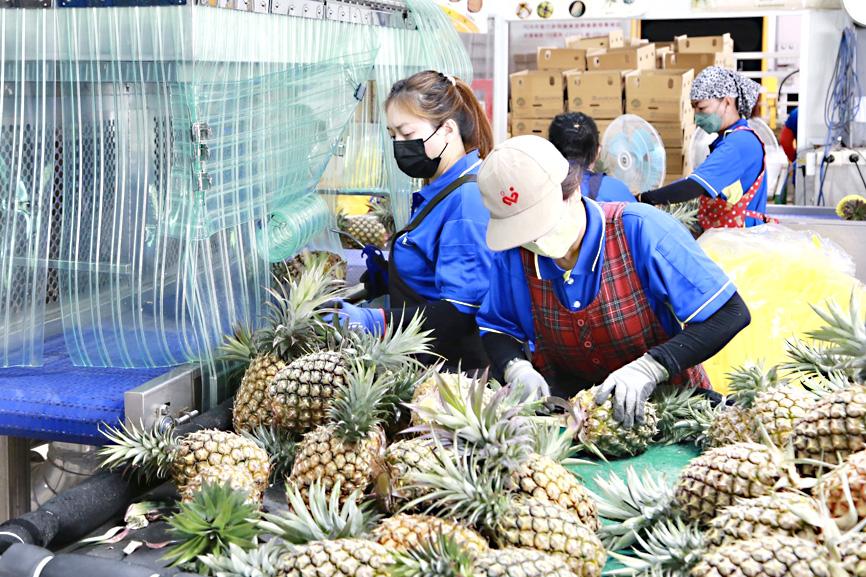Pineapple exports have so far this year risen more than 12 percent, showing that the industry has cast off reliance on the Chinese market following Beijing’s ban on imports of the fruit from Taiwan last year.
Exports of pineapples totaled 9,805 tonnes in the first three months, up 12.2 percent year-on-year, Council of Agriculture data showed.
This was despite the ban China imposed in March last year on imports of the tropical fruit from Taiwan, citing unspecified pests.

Photo: CNA
Council Minister Chen Chi-chung (陳吉仲) spoke alongside Tainan Mayor Huang Wei-che (黃偉哲) at a news conference in the city yesterday touting pineapple exports to Japan.
Ceremoniously closing a truck ready to ship nearly 14 tonnes of pineapples overseas, the officials thanked Japanese for their enthusiastic support of Taiwanese agriculture.
Even after China banned imports without warning, Taiwan’s growers found other markets with help from the council and the Agriculture and Food Agency, Huang said.
Although this year has seen a smaller export volume than during the same period last year, the quality is better, meaning that selling prices can be higher, he said.
The council last year acted quickly to promote local consumption and exports of pineapples, as well as the creation of value-added products, ensuring that growers did not feel the effects of China’s ban, the Tainan Agriculture Bureau said in a statement yesterday.
Taiwan last year exported a total of 28,000 tonnes of pineapples, council data showed.
Excluding exports to China, those bound for other markets increased by 533 percent from 2020.
Japan received nearly 18,000 tonnes, up 726 percent.
The council this year is still promoting pineapples to new markets, with the goal of increasing exports to 30,000 tonnes.
The council appears on track to achieve its goal, even without the Chinese market, the bureau said.
Successfully capturing the confidence of Japanese consumers also proves the quality of Taiwanese produce, as Japan imposes strict import quality and safety controls, the bureau added.

Taiwan is stepping up plans to create self-sufficient supply chains for combat drones and increase foreign orders from the US to counter China’s numerical superiority, a defense official said on Saturday. Commenting on condition of anonymity, the official said the nation’s armed forces are in agreement with US Admiral Samuel Paparo’s assessment that Taiwan’s military must be prepared to turn the nation’s waters into a “hellscape” for the Chinese People’s Liberation Army (PLA). Paparo, the commander of the US Indo-Pacific Command, reiterated the concept during a Congressional hearing in Washington on Wednesday. He first coined the term in a security conference last

A magnitude 4.3 earthquake struck eastern Taiwan's Hualien County at 8:31am today, according to the Central Weather Administration (CWA). The epicenter of the temblor was located in Hualien County, about 70.3 kilometers south southwest of Hualien County Hall, at a depth of 23.2km, according to the administration. There were no immediate reports of damage resulting from the quake. The earthquake's intensity, which gauges the actual effect of a temblor, was highest in Taitung County, where it measured 3 on Taiwan's 7-tier intensity scale. The quake also measured an intensity of 2 in Hualien and Nantou counties, the CWA said.

The Overseas Community Affairs Council (OCAC) yesterday announced a fundraising campaign to support survivors of the magnitude 7.7 earthquake that struck Myanmar on March 28, with two prayer events scheduled in Taipei and Taichung later this week. “While initial rescue operations have concluded [in Myanmar], many survivors are now facing increasingly difficult living conditions,” OCAC Minister Hsu Chia-ching (徐佳青) told a news conference in Taipei. The fundraising campaign, which runs through May 31, is focused on supporting the reconstruction of damaged overseas compatriot schools, assisting students from Myanmar in Taiwan, and providing essential items, such as drinking water, food and medical supplies,

Prosecutors today declined to say who was questioned regarding alleged forgery on petitions to recall Democratic Progressive Party (DPP) legislators, after Chinese-language media earlier reported that members of the Chinese Nationalist Party (KMT) Youth League were brought in for questioning. The Ministry of Justice Investigation Bureau confirmed that two people had been questioned, but did not disclose any further information about the ongoing investigation. KMT Youth League members Lee Hsiao-liang (李孝亮) and Liu Szu-yin (劉思吟) — who are leading the effort to recall DPP caucus chief executive Rosalia Wu (吳思瑤) and Legislator Wu Pei-yi (吳沛憶) — both posted on Facebook saying: “I